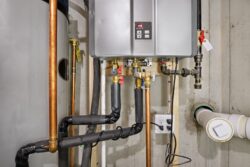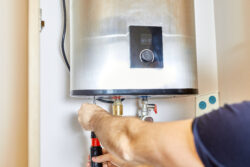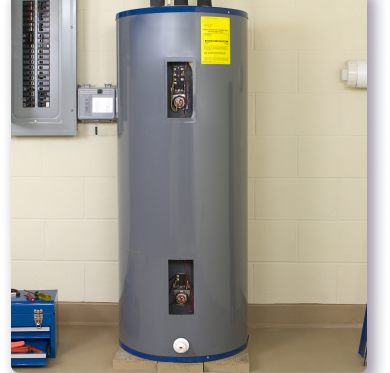For most Denver homeowners, a water heater is one of those household appliances they never think about until something goes wrong. Your water heater quietly works in the background to provide hot water for showers, dishwashing, laundry, and countless other daily activities. Recognizing the early warning signs that you need a new water heater can save you from the inconvenience of cold showers and potentially costly water damage. Some issues can be repaired by a professional plumber, while others indicate it’s time for a complete replacement.

How Long Does a Water Heater Typically Last?
Traditional tank models typically last eight to 12 years, while more modern tankless models can last 15 to 20 years with regular maintenance. While dealing with the average lifespan of a water heater, there are also a few factors to keep in mind:
- Water quality: Denver’s hard water contains a high amount of minerals, such as calcium and magnesium, which can cause sediment buildup in a tanked model and shorten its lifespan if not routinely flushed.
- Maintenance habits: Routine maintenance tasks, such as replacing an anode rod every few years, can increase the lifespan of your water heater.
- Age: If your water heater is nearing the end of its lifespan, it’s beneficial to be proactive and start researching replacement options to avoid an unexpected breakdown.
Common Signs It’s Time to Replace Your Water Heater
Your water heater might not come with a warning light or a notification, but it does have ways of telling you when something is wrong. If you start noticing strange noises, odd smells, or water that doesn’t act like it used to, you never want to brush it off. These symptoms often signal that the unit is nearing the end of its lifespan.
Below are some of the most obvious water heater replacement signs.
Inconsistent or Insufficient Hot Water
If you turn the tap to hot and only get lukewarm water, something isn’t right. Also, if you notice that hot water doesn’t last long during showers or other daily activities, your water heater may be struggling to meet demand. This could be due to a malfunctioning thermostat or a worn-out heating element, making it impossible to maintain consistent temperatures throughout the tank.
Leaks Around the Water Heater Tank
A water heater leaking from the bottom or anywhere around the unit is a serious concern that usually indicates a major problem. Smaller leaks might seem manageable at first and easy to repair, but they typically worsen over time and can lead to significant water damage in your home. Leaks often develop due to corrosion, pressure buildup, or worn-out connections.
Rusty or Discolored Water
If your hot water has started to take on a brown, red, or yellow tint, you could be dealing with internal corrosion and a rusty water heater tank. This problem may cause your water to have a metallic smell.
It’s important to know the difference between rust from your water heater and rust from your home’s plumbing pipes. Run only cold water from the same tap. If only the hot water appears rusty, the problem likely originates from your water heater. This type of internal corrosion cannot be fixed and typically requires unit replacement.
Unusual Noises Coming from the Tank
Strange noises, such as rumbling, popping, or banging sounds, often indicate sediment buildup at the bottom of the tank. When the burner heats, the sediment traps water beneath it. In turn, it creates those mini explosions of sound. While flushing the tank can help reduce the noise, if it persists, it likely means there’s a lot of sediment. This problem reduces your water heater’s efficiency and speeds up wear and tear on the tank. It can cause overheating, pressure buildup, or tank failure if left unchecked.
Rising Energy Bills Due to Inefficiency
Water heater efficiency issues often appear as an increase in energy bill costs without any changes in usage. It’s easy to assume everything is fine if the unit isn’t leaking or making noise. However, with older models, that’s rarely the case. As water heaters age, they lose efficiency due to sediment buildup, worn components, and general wear and tear. Models manufactured more than 10 years ago lack the modern insulation, advanced controls, and energy-smart design features in today’s equipment.

Repair vs. Replace: How To Decide
Knowing when to replace your water heater instead of repairing it depends on several factors. The best way to decide is the “50% rule.” If repairs on an older unit are 50% of the cost of a new unit, it is often more economical to replace the water heater. The upfront cost may be higher, but a more efficient model is more cost-effective for your energy bills.
Traditional tank water heaters that are eight to 10 years old or older and experiencing multiple issues likely need to be replaced. Common water heater problems that require repeated service a few times a year may indicate an underlying issue.
However, if your unit is relatively new and experiencing a fixable problem, such as a faulty thermostat or heating element, repair may be the better option.
Benefits of Replacing Your Water Heater
Replacing an older water heater with a newer, ENERGY STAR-certified model leads to savings on your energy bill because these models consume less energy than standard-efficiency models. High-efficiency tank-style heaters have smarter thermostats, better insulation, and self-diagnostic features that keep them running at peak performance with minimal waste.
Tankless vs. Traditional: Which Is Right for You?
Tankless water heater replacement options have become increasingly popular due to their energy efficiency and space-saving designs. Tankless water heaters don’t store water. Instead, they can heat water as you need it, so you’ll never run out. Plus, you won’t waste energy keeping 40 to 50 gallons of water hot all day. They also take up less space.
Tankless units cost more upfront, but last longer and can provide unlimited hot water with moderate usage patterns. Consider your budget and hot water usage, and consult a technician from Horizon Services to discuss potential energy savings.
When To Call a Professional for Water Heater Installation
Professional water heater installation by a certified plumber ensures safety, local code compliance, and optimal performance. Water heater installation involves working with electrical connections, gas lines (for gas units), plumbing modifications, and proper venting, all of which require specialized knowledge and tools.

Don’t Wait Until Your Water Heater Fails
If you’re experiencing water heater issues in your Denver home or you have questions about whether to replace your unit, Horizon Services is here to help. Call our plumbing services team for repairs or replacements of traditional and tankless water heater systems.


